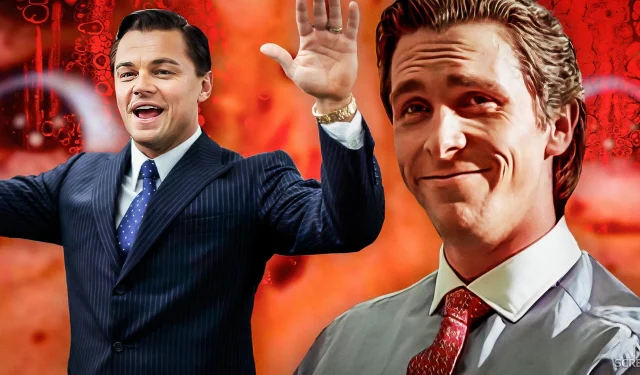
Misinterpretations of filmmakers’ intentions can sometimes lead to accusations of glorifying dubious behaviors. When it comes to satire, subtlety is key; the audience often has to engage critically to uncover the intended message. When directors showcase redeemable traits in flawed characters, it can create confusion about the film’s moral stance.
10 The Wolf Of Wall Street (2013)
Scorsese’s Financial Satire: A Celebration in Disguise
Among the various films that provoke heated discussions, *The Wolf of Wall Street* stands out for its portrayal of excess and corruption. Directed by Martin Scorsese, this film faces scrutiny over whether it glamorizes the very misconduct it aims to critique. The narrative follows Jordan Belfort, a stockbroker portrayed by Leonardo DiCaprio, who rises to wealth through fraud and manipulation.
By incorporating humor and a vibrant soundtrack, Scorsese crafts a narrative that feels like an extravagant party, drawing audiences into Belfort’s world. The cameo appearance of Belfort himself reinforces the debate, especially as Scorsese insists that those who view the film as aspirational are missing the underlying critique. While lampooning the Wall Street culture, the film also analyzes the systemic failures enabling such unethical behavior.
9 American Psycho (2000)
The Charismatic Allure of Patrick Bateman
As rumors circulate about a new adaptation of *American Psycho* featuring Austin Butler as Patrick Bateman, comparisons with Christian Bale’s iconic portrayal linger. Bale’s performance transformed Bateman into a captivating anti-hero, blending charm with psychopathy. Unlike stereotypical movie villains, Bateman’s superficial appeal and success in the high-powered business world create a unique dual identity.
His sociopathic tendencies lie beneath a polished exterior, making him both relatable and repulsive. While committing heinous acts, such as the murder of Paul Allen, Bateman effortlessly engages in cultural discussions, blurring the line between admiration and horror.
8 Scarface (1983)
Tony Montana and the Illusion of the American Dream
Al Pacino’s portrayal of Tony Montana in *Scarface* is a powerful exploration of ambition and downfall. As a Cuban immigrant navigating the drug trade to achieve the American Dream, Tony’s story culminates in tragedy. His meteoric rise is filled with violence and loss, emphasizing the pitfalls of unchecked ambition.
The film subtly critiques the American Dream’s false promises while showcasing Montana’s pursuit of wealth and status through illicit means. His self-destructive streak ultimately raises questions about personal accountability in a system that rewards merciless ambition.
7 Joker (2019)
Challenging Societal Norms through Joker
The Joker has been represented in various forms over the years, but the 2019 film offers a groundbreaking take on the character. It positions Joker, played by Joaquin Phoenix, as an emblem of rebellion against societal injustices. While his tactics are extreme, many sympathize with his motivation to confront social wrongs.
The film’s portrayal of a chaotic world reflects deeper societal issues, prompting viewers to contemplate the realities of marginalization. By examining Arthur Fleck’s transformation into the Joker, the film provokes critical discourse about the intersection of mental health and societal neglect, ultimately blending satire with poignant social commentary.
6 Fight Club (1999)
The Allure of Tyler Durden
Film genres intersect in *Fight Club*, which is both a psychological thriller and a social critique. It dissects contemporary issues such as consumerism and societal conformity through the lens of the Narrator’s relationship with Tyler Durden. The film highlights the absurdity of everyday life, capturing a generation’s disenchantment.
Tyler’s philosophy advocates for a return to primal instincts as a response to modern malaise. What begins as a form of catharsis evolves into a movement that aims to overthrow societal norms, culminating in moral ambiguity regarding Tyler’s motivations and methods.
5 Borat (2006)
Controversy Surrounds Borat’s Satirical Edge
Sacha Baron Cohen’s *Borat* challenges cultural norms through satire, featuring a naive journalist who travels across America. The film critiques regressive attitudes by embodying an exaggerated caricature, revealing the latent prejudices within society. However, its depiction of Kazakhstan has faced significant backlash.
Despite its intent, many viewers misinterpret the film’s humor, sometimes aligning with the very stereotypes it seeks to critique. This misreading perpetuates harmful misconceptions, leading to mixed receptions for *Borat Subsequent Moviefilm* as well.
4 Zoolander
Endearing Idiocy in Zoolander
Throughout their misadventures, Derek and Hansel inadvertently showcase that even those who appear dim-witted can achieve redemption and comedic success, emphasizing an underlying humanity amidst their flaws.
3 The Gentlemen
Guy Ritchie’s Stylish Crime Narrative
In *The Gentlemen*, director Guy Ritchie combines elements of crime with charm, depicting a suave drug lord, played by Matthew McConaughey, whose empire weaves through British high society. Known for intricately woven plots, Ritchie presents a cast of characters full of complexity, some embodying the aspirational qualities of traditional heroes despite their criminal undertakings.
The film’s characters oscillate between villainy and virtue, exploring the nuances of morality within the criminal underworld.
2 The Social Network
A Deep Dive into Silicon Valley’s Rise
David Fincher’s *The Social Network* narrates the inception of Facebook, providing insight into the complexities of ambition, betrayal, and the ethics of modern tech culture. The film delves into Mark Zuckerberg’s journey, portraying the enigma behind his character as both a visionary and a flawed human being.
Although it presents a somewhat critical view of Zuckerberg’s rise to success, the film still inadvertently glorifies his achievements amidst unethical behavior. This juxtaposition raises vital questions about how society rewards certain types of ambition, intertwining personal narrative with broader social implications.
1 Superbad
Celebrating Teen Rebellion
*Superbad* epitomizes the essence of timeless teen comedy, centered on a group of high schoolers yearning for one last celebration before college. With a humorous take on immature decisions and antics, the film captures the chaotic energy and flightiness of adolescence.
Despite acknowledging reckless behavior and poor choices, *Superbad* manages to elicit laughter while portraying youth’s indiscretions as a rite of passage. Its comedic brilliance combined with relatable moments solidifies its place as an iconic representation of teen rebellion in cinema.




Leave a Reply